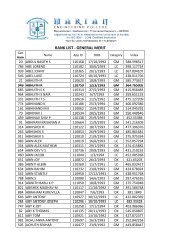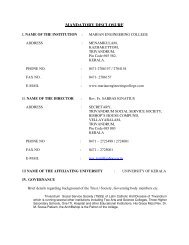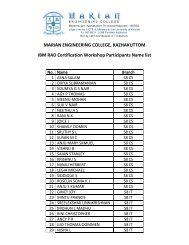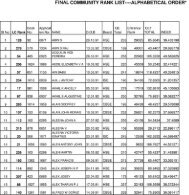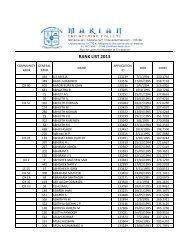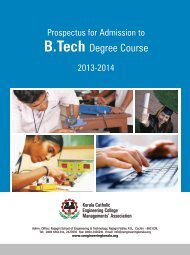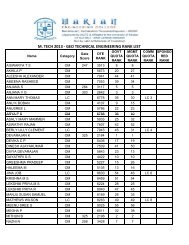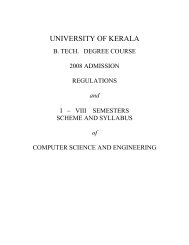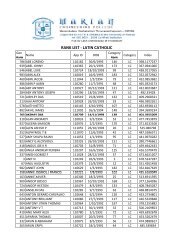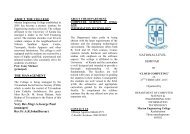UNIVERSITY OF KERALA - College of Engineering, Trivandrum
UNIVERSITY OF KERALA - College of Engineering, Trivandrum
UNIVERSITY OF KERALA - College of Engineering, Trivandrum
Create successful ePaper yourself
Turn your PDF publications into a flip-book with our unique Google optimized e-Paper software.
08 . 402 HUMANITIES<br />
(C T A F R H B )<br />
L T P/D Cr<br />
3 0 0 3<br />
PART-I ECONOMICS (2periods/week)<br />
Module I<br />
Definition <strong>of</strong> Economics – Basic Concepts Goods – Choice <strong>of</strong> techniques – Production possibility curve<br />
National Income concepts - GNP – GDP – NNP – Per Capita Income – Three Sectors <strong>of</strong> the Economy –<br />
Primary – Secondary, Tertiary Sector – Significance <strong>of</strong> Money.<br />
Meaning <strong>of</strong> Demand and Supply – Types <strong>of</strong> demand – Determinants <strong>of</strong> Demand – Demand forecasting<br />
Production function – Law <strong>of</strong> Variable proportion – Returns to scale - Least cost combination <strong>of</strong> inputs –<br />
Cost concepts – Cost output relationship<br />
Module II<br />
Inflation – causes <strong>of</strong> inflation – measures to control inflation – Demand – Pull inflation – cost push inflation<br />
– effects <strong>of</strong> Inflation – effects <strong>of</strong> inflations comparison between inflation and deflation<br />
India’s Economic crisis in 1991 – New economic policy – Global Financial meltdown in 2008 –<br />
Applicability <strong>of</strong> Keynesian Theory to UDC’S.<br />
Stock Market and present scenario – Industrial sector past and present – Industry Analysis – Electronics –<br />
Chemical – Automobile – FMCG Industry.<br />
Environment and Development – Basic Issues – Sustainable Development and Environmental Accounting –<br />
Population – Resources and the Environment – Poverty and the Environment – Growth versus the<br />
Environment – The Global Environment .<br />
PART II - ACCOUNTANCY (1period/week)<br />
Module III<br />
Book- Keeping and Accountancy -Elements <strong>of</strong> Double Entry -Book- Keeping-rules for journalizing -Ledger<br />
accounts –Cash book-Banking transactions – Trial Balance- Method <strong>of</strong> Balancing accounts- the journal proper<br />
(simple problems).<br />
Final accounts: Preparation <strong>of</strong> trading and pr<strong>of</strong>it and loss Account- Balance sheet (with simple problems) -<br />
Introduction to Accounting packages (Description only)<br />
References:<br />
1. K.K Dewett, ‘Modern Economic theory’, S.Chand &Co.<br />
2. Michael-Todaro, ‘Economic Development’, Addison Wesley Longman Ltd.<br />
3. Mohinderkumar Sharma, ‘Business Environment in India’.<br />
4. D.M .Mithani. ‘Money,Banking, International Trading and Public finance’, Himalaya publishing<br />
house,NewDelhi<br />
5. Rudder Dutt and K.P.M.Sundaran,Indian Economy, S.Chand & Co.<br />
6. Hal R Varian- Intermediate micro Economics, W.W.Norton & Co.<br />
7. Koutsiannis (second edition) Micro Economics<br />
8. Batliboi - Double Entry book Keeping<br />
9. Dr K.G. Chandrasekharan Nair - A Systematic approach to Accounting<br />
University question:<br />
Note: Part I and Part II to be answered in separate answer books.<br />
Part – I. Economics<br />
Part A – 30 Marks (short answers) covering entire syllabus (3x10=30)<br />
Part B – 40 marks (50% choice one out <strong>of</strong> two or two out <strong>of</strong> four from each module)<br />
Part – II. Accountancy<br />
Three questions covering entire syllabus out <strong>of</strong> which two questions have to be answered (2x15=30)<br />
37



